标签:style blog http io 使用 java ar strong for
最初对js中 object.constructor 的认识:
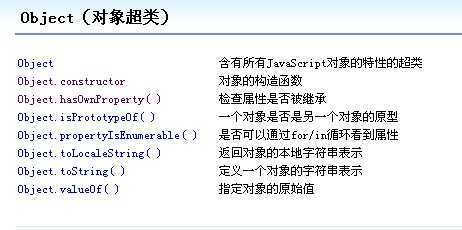
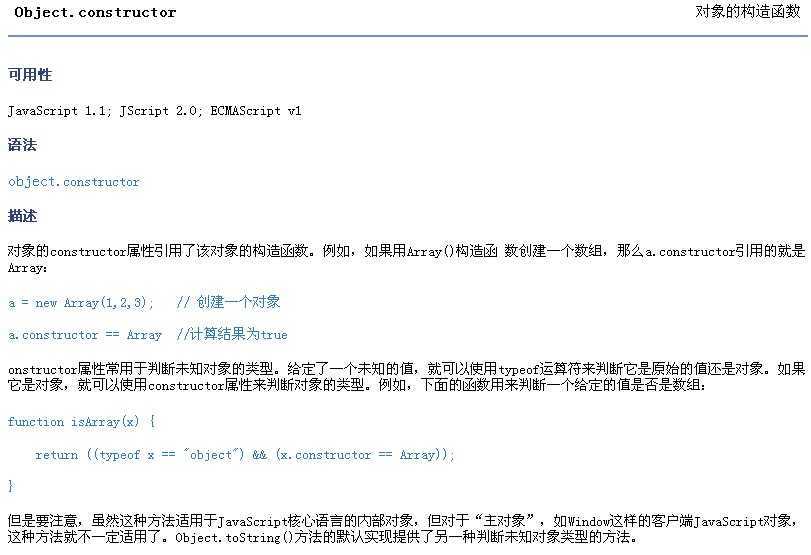









在学习JS的面向对象过程中,一直对constructor与prototype感到很迷惑,看了一些博客与书籍,觉得自己弄明白了,现在记录如下:
我们都知道,在JS中有一个function的东西。一般人们叫它函数。比如下面的代码
function Person(name)
{
alert(name);
}
Person(‘js‘);//js
上面的代码中,Person的表现的确跟一般的函数没有什么区别,接着看下面的代码
 代码
代码
function Person(name)
{
this.name=name;
this.showMe=function()
{
alert(this.name);
}
};
var one=new Person(‘JavaScript‘);
one.showMe();//JavaScript
很多人见到了久违的new操作符,于是就叫Person为“类”,可是又没有关键字class的出现,觉得叫“类”有点勉强。于是退而求其次叫Person为类的构造函数。这些概念好像都没有错,之所以出现这样的情况,可能是因为大家都学习了传统的面向对象语言(c++,c#,java等),还有一种思维定势吧。为了让javascript也面向对象,要在javascript中找到与传统面向对象语言的影子。可是按照javascript的说法,function定义的这个Person就是一个Object(对象),而且还是一个很特殊的对象,这个使用function定义的对象与使用new操作符生成的对象之间有一个重要的区别。这个区别就是function定义的对象有一个prototype属性,使用new生成的对象就没有这个prototype属性。
prototype属性又指向了一个prototype对象,注意prototype属性与prototype对象是两个不同的东西,要注意区别。在prototype对象中又有一个constructor属性,这个constructor属性同样指向一个constructor对象,而这个constructor对象恰恰就是这个function函数本身。
有点头晕,看下图吧:
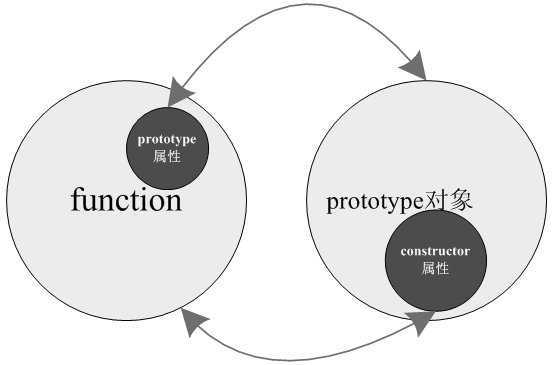
不相信可以看下面的代码:
 代码
代码
function Person(name)
{
this.name=name;
this.showMe=function()
{
alert(this.name);
}
};
var one=new Person(‘js‘);
alert(one.prototype)//undefined
alert(typeof Person.prototype);//object
alert(Person.prototype.constructor);//function Person(name) {...};
上面的代码证明了one这个对象没有prototype属性。
我们接着看代码:
 代码
代码
function Person(name)
{
this.name=name;
this.showMe=function()
{
alert(this.name);
}
};
Person.prototype.from=function()
{
alert(‘I come from prototype.‘);
}
var one=new Person(‘js‘);
one.showMe();//js,这个结果没有什么好奇怪的
one.from();//I come from prototype.,这个结果有一点奇怪吧
要解释这个结果就要仔细研究一下new这个操作符了.var one=new Person(‘js‘);这个语句执行的过程可以分成下面的语句:
var one={};
Person.call(one,‘js‘);
按照《悟透javascript》书中说的,new形式创建对象的过程实际上可以分为三步:
第一步是建立一个新对象(叫A吧);
第二步将该对象(A)内置的原型对象设置为构造函数(就是Person)prototype 属性引用的那个原型对象;
第三步就是将该对象(A)作为this 参数调用构造函数(就是Person),完成成员设置等初始化工作。
其中第二步中出现了一个新名词就是内置的原型对象,注意这个新名词跟prototype对象不是一回事,为了区别我叫它inobj,inobj就指向了函数Person的prototype对象。在person的prototype对象中出现的任何属性或者函数都可以在one对象中直接使用,这个就是javascript中的原型继承了。
又头晕了,上图吧!
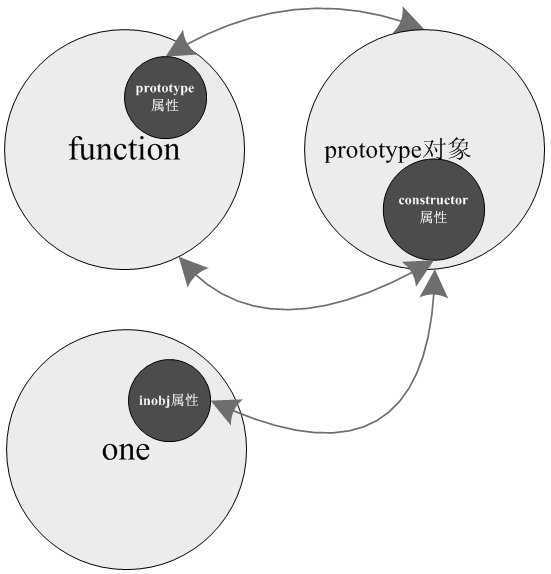
这样one对象通过内置的原型对象inobj就可以直接访问Person的prototype对象中的任何属性与方法了。这也就解释了上面的代码中为什么one可以访问form函数了。因为prototype对象中有一个constructor属性,那么one也可以直接访问constructor属性。
 代码
代码
function Person(name)
{
this.name=name;
this.showMe=function()
{
alert(this.name);
}
};
Person.prototype.from=function()
{
alert(‘I come from prototype.‘);
}
var one=new Person(‘js‘);
one.showMe();//js,这个结果没有什么好奇怪的
one.from();//I come from prototype.,这个结果有一点奇怪吧
alert(one.constructor);//function Person(name) {...}
alert(Person.prototype.constructor);//function Person(name) {...}
接着看继承是如何实现的。
 代码
代码
function Person(name)
{
this.name=name;
this.showMe=function()
{
alert(this.name);
}
};
Person.prototype.from=function()
{
alert(‘I come from prototype.‘);
}
function SubPerson()
{
}
SubPerson.prototype=new Person();
var subOne=new SubPerson();
subOne.from();//I come from prototype.
alert(subOne.constructor);//function Person(name) {...};
alert(SubPerson.prototype.constructor);//function Person(name) {...};
继承的实现很简单,只需要把子类的prototype设置为父类的一个(实例化)对象即可。注意这里说的可是对象哦!
那么通过prototype属性实现继承的原理是什么呢?还是先看图形说明,然后编写代码进行验证。
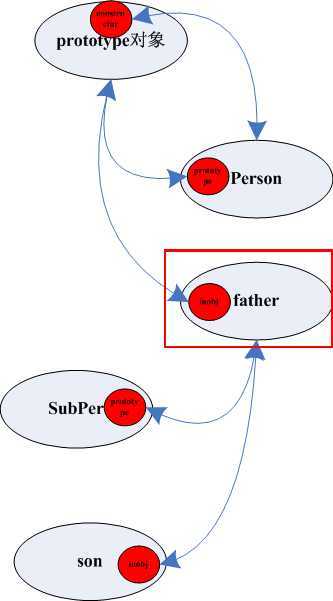
注意:红色的方框就是把子类与父类链接起来的地方。这个就应该是传说中的prototype链了吧。下面有代码进行验证。
 代码
代码
function Person(name)
{
this.name=name;
this.showMe=function()
{
alert(this.name);
}
};
Person.prototype.from=function()
{
alert(‘I come from prototype.‘);
}
var father=new Person(‘js‘);//为了下面演示使用showMe方法,采用了js参数,实际多采用无参数
alert(father.constructor);//查看构造函数,结果是:function Person(name) {...};
function SubPer()
{
}
SubPer.prototype=father;//注意这里
SubPer.prototype.constructor=SubPer;
var son=new SubPer();
son.showMe();//js
son.from();//I come from prototype.
alert(father.constructor);//function SubPer(){...}
alert(son.constructor);//function SubPer(){...}
alert(SubPer.prototype.constructor);//function SubPer(){...}
根据上图的prototype链,还有代码的结果,我想应该明白为什么使用prototype能够实现
JS中的继承了吧。
摘自:http://blog.csdn.net/niuyongjie/archive/2009/11/15/4810835.aspx
http://www.cnblogs.com/qiantuwuliang/archive/2011/01/08/1930548.html
【JavaScript】关于JS中的constructor与prototype
标签:style blog http io 使用 java ar strong for
原文地址:http://www.cnblogs.com/daishuguang/p/3976095.html











 代码
代码

 代码
代码
 代码
代码

 代码
代码
 代码
代码

 代码
代码